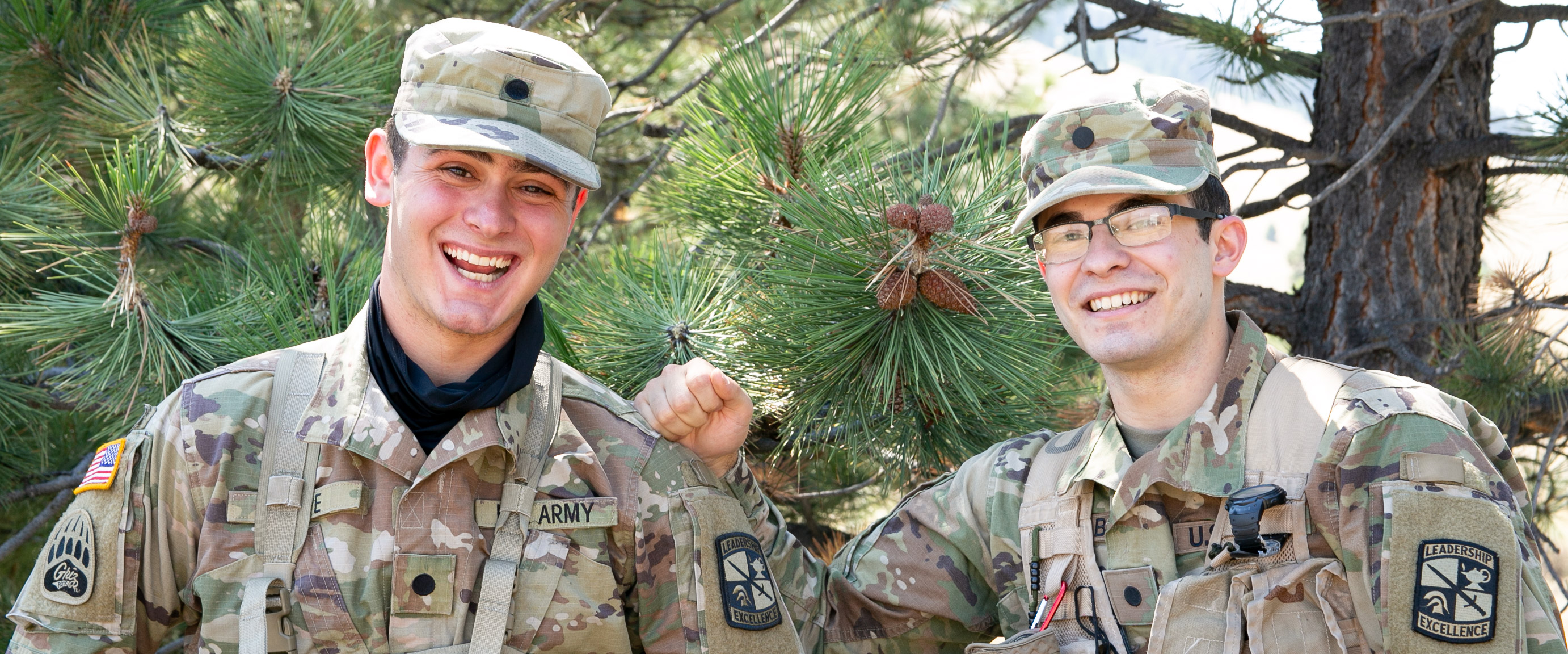Options
OFFICER
What is an officer?
Officers are the managers of the military. Officers work in leadership roles that require planning and decision making that will effect the operations of those Soldiers who fall underneath of them. All officer positions require a four-year degree or equivilent. There are multiple ways to earn your commission and become an officer in the Montana Army National Guard. Read below for more information!
☆ Reserve Officer Training Corps (ROTC)
Montana Army National Guard Soldiers can earn their commission as they earn their degree with the Simeultaneous Membership Program (SMP) through ROTC. Montana currently offers the ROTC Program through University of Montana, Montana State University, and Carroll College. To meet with a recruiter and learn more about ROTC and SMP, click here.
☆ Officer Candidate School (OCS)
The Montana Army National Guard offers two versions of the Officer Candidate School or OCS: Federal or State. Federal OCS takes place over XYZ amount of weeks in THIS PLACE. State OCS is one weekend a month and THIS MANY WEEKS in the summer over the span of 18 months. After 6 months in State OCS you'll have the opportunity to GO FASTER and these are some more words.
☆ West Point
High school seniors and enlisted Soldiers can earn an appointment to the United States Military Academy (USMA) or the United States Military Academy Preparatory School (USMAPS) at West Point. Upon graduation, you will be commissioned as a second lieutenant in the Army and serve for five years on Active Duty.
☆ Direct Commission
This commission is based on previous experience and proven capabilities, which take the place of your initial training.
Officer Branches
| Branch | Focus | Description |
|---|---|---|
| Combat Arms Branch | Infantry | An infantry officer is responsible for leading and controlling the infantry and combined armed forces during land combat. |
| Armor | Armor officers are responsible for tank, cavalry, and reconnaissance operations on the battlefield. | |
| Field Artillery | The field artillery branch is responsible for neutralizing or suppressing the enemy by cannon, rocket and missile fire, and for overseeing the combined use of all fire support. | |
| Air Defense | Artillery air defense officers are experts in air defense tactics, techniques, and procedures, and leaders in air defense operations. | |
| Aviation | Aviation officers are expert aviators first, overseeing aviation operations from maintenance to control tower operations to domestic and combat missions. | |
| Corps of Engineers | Engineer officers help the Army and the nation build structures, develop civil works programs and work with natural resources, as well as provide combat support. | |
| Combat Support Branches | Signal Corps | Signal Corps officers are experts in installing, operating, and maintaining all aspects of the Guard's communication, data and information systems and services. |
| Military Police Corps | Military Police (MP) officers oversee area security, law and order, police intelligence and maneuer support in peacetime and combat, plus internment and resettlement. | |
| Military Intelligence Corps | Military Intelligence officers are always out front, providing essential intelligence and information about the enemy terrain and weather conditions. | |
| Chemical Corps | Chemical officers are experts in nuclear, biological and radiological defense and warfare, and homeland protection. They also lead chemical units in combat support. | |
| Combat Service Support Branches | Adjutant General Corps | An . adjutant general offier is responsible for overseeing Soldiers' general welfare and well-being. Duties are similar to those of human resources executives. |
| Finance Corps | The finance corps is responsible for all Guard financial matters - purchasing supplies and services, balancing budgets, and being sure Soldiers are paid for their service. | |
| Transportation Corps | Transportation officers specialize in vehicles and transport procedures, leading transportation operations and movement of troops and supplies during land combat. | |
| Ordinance Corps | Ordinance officers are responsible for ensuring that weapons systems, munitions, vehicles and equipment are ready and in perfect working order at all times. | |
| Quartermaster Corps | Quartermaster officers oversee availablity and function of materials and systems from food, water, and petroleum to parachte maintenance and general equipment repair. |
Interested? Check out our basic qualifications:
HERE
For more information on becoming an officer please contact:
2LT Terrence Tolson
(406) 324-3648
Warrant Officer Option
What is a Warrant Officer?
Warrant officers are a unique group. They are, in fact, commissioned officers, but they're also considered to be in a class by themselves due to their highly specialized technical expertise in specific areas. There are two different types of Warrant Officer: Technical and Aviation. Read below for more information!
☆ Technical Warrant Officer
Technical Warrant Officers are the Army's mechanical experts. At higher ranks they're also responsible for training others. In Montana, there are over 17 different Technical Warrant Officer Military Occupational Specialties (MOS). To see some examples of the job opportunies click here.
☆ Aviation Warrant Officer
Joining the warrant officer aviation program as a helicopter pilot means you’ll be controlling some of the most advanced aircraft in the sky. National Guard aviators are among the best in the world. You will have the skills and ability to change the outcome of disastrous scenarios where failure is not an option. A respected position in the National Guard, aviation warrant officers deal in high-pressure situations delivering payloads to critical areas, engaging enemy targets and rescuing people from life-threatening situations.
Interested? Check out our basic qualifications:
HERE
For more information on becoming an officer please contact:
CW3 Jason Pattee
(406) 439-8612
© Copyright 2020 Montana Army National Guard






